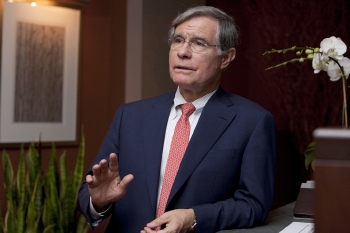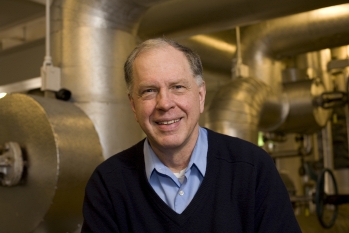WORTH SUPPORTING
A conversation with David Croll: Why hiring new faculty without delay makes good academic and strategic sense

Trustee David Croll '70 made the lead gift in 2010 to launch Cornell's Faculty Renewal Initiative. See larger image
David Croll '70 earned a degree in engineering and then went on to Harvard Business School and a three-decade career as a venture capitalist. Talk to him about Cornell for even a few minutes, and this dual pedigree is evident: Croll brings both the focused, solutions-orientation of an engineer and the incisiveness of a high-stakes investor to his roles as donor, trustee and chair of the Cornell Board of Trustees' Finance Committee. In June 2010 Croll made the lead gift – $5 million – to launch Cornell's Faculty Renewal Initiative. The aim is to raise $100 million in current-use funding over five years so that Cornell can recruit leading faculty members ahead of the coming wave of retirements in higher education.
In 2007 he endowed the David D. Croll Professorship of Sustainable Energy Systems in the College of Engineering, currently held by Jeff Tester, who was recruited from the Massachusetts Institute of Technology for the position.
We recently talked with Croll about his views on faculty renewal and what it means for Cornell in today's economy.
Why have you advocated for making faculty renewal a top priority?
Two words: be strategic. Most people who analyze this know what's coming in the next five to 15 years. There's a massive lump in the boa constrictor: Over half the faculty in higher education are retiring. There aren't enough newly minted Ph.D.s coming through the system to cover them. You cannot imagine the stress that's going to put on higher education.
The people about to leave are the Nobel laureates and academy members and the top people in their fields. It just won't cut it to replace these prominent individuals with people who got their Ph.D.s three years ago and aren't even recognized – especially where the middle ranks of a department are thin. To maintain the quality of the academic departments, it will be necessary to hire away midcareer faculty from other institutions.
Plus, Cornell needs top researchers to maintain our research dollars. Cornell is one of the top three universities in the country in National Science Foundation (NSF) and National Institutes of Health funding. That money goes where the great professors are. We can't let that slip. A newly minted Ph.D. won't get a $20 million grant from the NSF. When a top person retires, you've got to have someone stepping into the slot who can make that happen.
What are the faculty recruitment goals?
We need to get back to hiring 35 to 50 professors per year. Before the economic crisis we were hiring, on average, 50 per year. Last year, through attrition, the total number of professors at Cornell declined by 35. That's significant for a faculty of our size. I know the president and provost are committed to getting back to hiring 50 per year right away.
Isn't Cornell similarly vulnerable to recruiting from outside?
Sure. But right now many of those institutions aren't hiring because of the financial squeeze, so it's a really good job market for Cornell to enter. There's going to be a hiring tsunami starting in about five years. We've got to think long term and get out there before others do, and hire aggressively.
Part of it is stickiness. Once professors and their partners come to Cornell and become acclimated to Ithaca's lifestyle, the chance we will keep them is much higher. We can still lose people, but the chances are lower.
And we have to be good at figuring out employment for accompanying partners. The hard part about Ithaca is that, unlike Cambridge or even Princeton, there aren't always a lot of opportunities for the spouse or significant other.
Is the university in a financial position to hire aggressively?
Even though we feel a little poor right now – the endowment's down, we're recovering from a recession – we've got to be strategic. There's no reason not to do this.
Now that financial aid has been doubled and made totally competitive with our peer group – which was David [Skorton's] first priority – the absolute next priority is to hire faculty now. We have got to deal with this waterfall, this runoff, of our most prestigious faculty. We can certainly raise $100 million for this purpose out of our $4 billion campaign; in this context this is not a big deal.

Jeff Tester was recruited from the Massachusetts Institute of Technology to be the first David D. Croll Professor of Sustainable Energy Systems in the College of Engineering. See larger image
That $100 million will be for the operating budget and not for rebuilding the endowment. Why?
Five years from now, because of the retirements, existing faculty lines will start to free up, and we'll have more money. So we don't need to endow these hires. We need to bridge – so that we can start hiring in this environment instead of waiting. And I would say this is the top priority for every dean.
Why does the number of professors we hire matter so much?
Part of it is rankings. In a few years our faculty-student ratio has gone to 10-to-one from eight-to-one. That's caused us to slip in the U.S. News & World Report ranking. So not only is it strategic to hire people now, but a collateral benefit is that rebuilding the numbers could help Cornell to maintain its stature.
We can all say there are flaws in that ranking, but believe me, every kid applying to college knows what our rank is and knows whether it's going up or down. And so do the professors we interview to come to Cornell.
What motivates your personal investments in faculty?
In every educational venue I've been involved in, all my philanthropy has been targeted at faculty. I believe strongly that if you have an excellent faculty, everything else will follow. Students will come to Cornell not because we offer them generous financial aid. They'll come to Cornell because it's a top-rated school with top-rated faculty – the intellectual capital of the university.
The first $5 million gift I made was to recruit Jeff Tester from MIT as the first Croll Professor of Sustainable Energy Systems because I really wanted to accelerate sustainability at Cornell. He'd been head of the MIT energy lab for the past 12 years. I wanted us to bring in a leader in the field.
And in the meantime, I became chair of the Finance Committee. I felt it was very important to make the statement that the important thing right now is to renew the faculty. Maintaining the excellence of the faculty is the No. 1 priority.
Are you interested in focusing on certain hiring areas first?
Absolutely: I want to see these funds put into strategic areas. Reimagining Cornell is about being efficient, but it's also about emphasizing what's important for the future – even if that means cutting or de-emphasizing things that were important 10 to 20 years ago, but less so now. The strategic plan identified areas where we want to put emphasis. Even though Ezra said "any person … any study," the reality is, you can't be everything to everybody.
Our hiring should be very strategic and very targeted. So often the only way you can shift emphasis is if someone retires over here, and so you then hire someone over there. This big turnover is daunting, but the healthy part is that it lets you realign your priorities.
Renewable energy, to me, seems to be the biggest issue of the 21st century. So that's why we need to really put resources there. Some of the faculty hired with my commitment hopefully will be hired in the area of renewable energy. I think we'll probably go strongly into something like power systems and the grid. We're good at it – but our top guy is retiring, so we're out trying to replace him now.
What distinguishes Cornell professors?
I like to say it's that they're practical and applied. Those are two things Cornell prides itself on. We come up with great inventions, and we get them out there to benefit society.
And I think the other thing is they're interdisciplinary. We make sure basic scientists really are working with engineers – sitting across the lunch table, working on the same projects. That's part of what Jeff Tester came to Cornell to do: to get people in silos working together so that the biofuels people in the College of Agriculture and Life Sciences are working with the membrane people in engineering, and the fuel cell people in the College of Arts and Sciences are working with engineering to solve common problems.
Cornell is unique insofar as it has all these top-rated colleges that can do that. For example, if you're addressing energy, and you don't have an ag school, you really can't talk about biofuels. And if you don't have a top architecture school, you can't really put an emphasis on green buildings. And the people who come here are people who want to take things from the lab into the field and want to work with people in other disciplines, because they think the discoveries are at the boundaries. More and more, it's not in pure chemistry, pure physics; it's where the two come together. Cornell is good at that, and we can be even better at it.